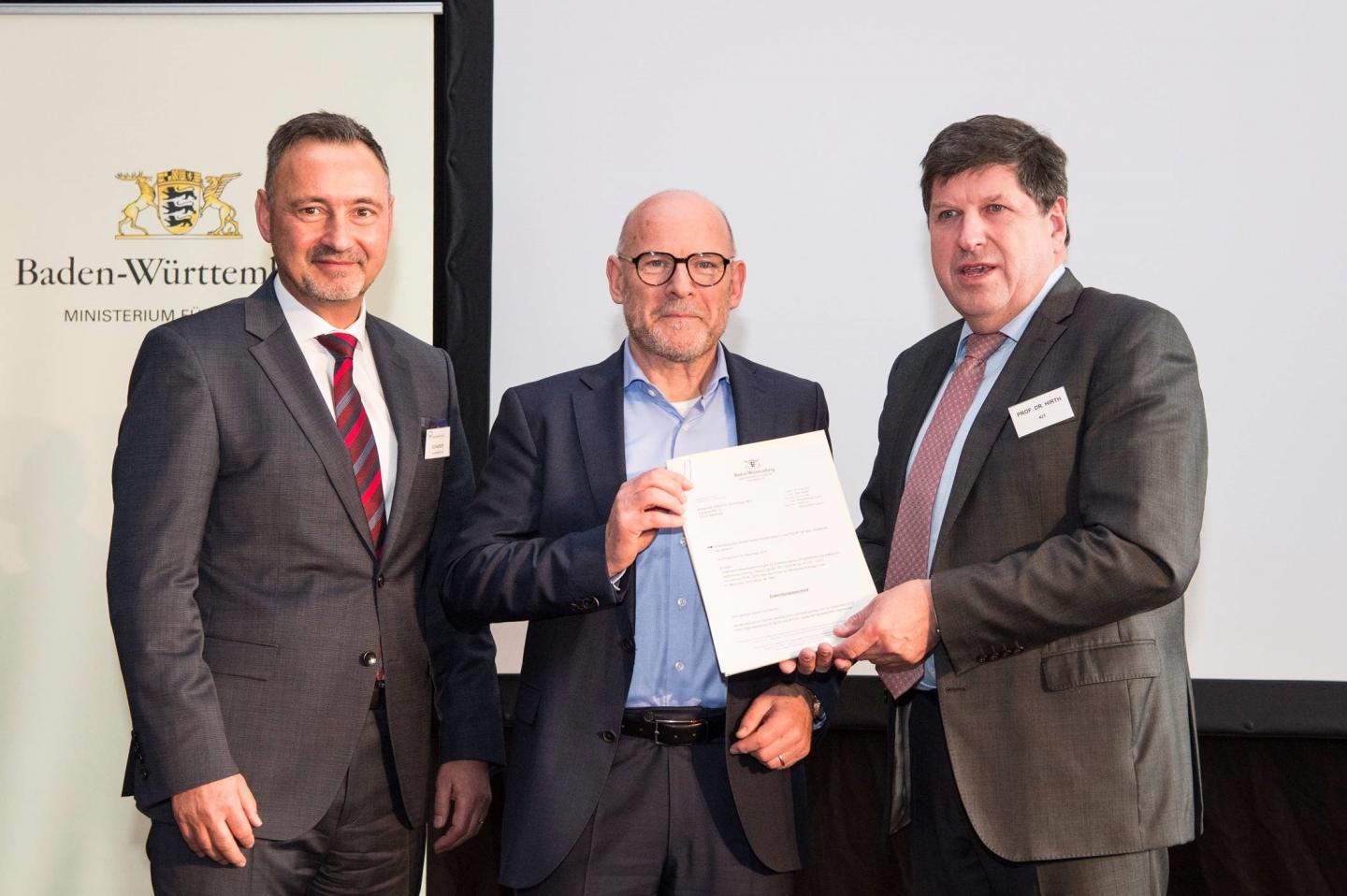Start of the project ‘reFuels — Re-thinking Fuels’ — State Transport Minister Hermann: ‘Fuel Production with the Help of Renewable Energy Serves Climate Protection’

Credit: Photo: Markus Breig, KIT
With the project “reFuels – Re-thinking Fuels,” the state government, Karlsruhe Institute of Technology (KIT), and industry wish to establish alternatives to fossil fuels. Today (January 18, 2019), State Minister of Transport Winfried Hermann officially started the project within the framework of the Policy Dialog on Automotive Industry.
Presently, the share of fossil fuel-based private and heavy-duty traffic in total CO2 emission amounts to 20% in Germany and, hence, is a major factor in climate change. Synthetic fuels, by contrast, can also be produced from non-fossil carbon sources and can thus help protect the climate. Among the technologies considered for this purpose is direct conversion of CO2 and renewable hydrogen. Within the project “reFuels – Re-thinking Fuels,” KIT, together with partners of automotive, automotive supply, and mineral oil industries, will study the potentials of these fuels for society, industry, and the environment in a holistic approach. The project will be funded by the Baden-Württemberg state government.
Reduction of CO2 Emission by Joint Efforts of Industry, Science, and Politics
“Within the framework of the ‘reFuels’ project, we want to study the potential of synthetic fuels, from manufacture using renewable energy sources to use in vehicles to commercialization scenarios. That is we want to cover the complete range of processes. We have to use all available means or technologies for climate protection,” said Transport Minister Hermann during the kickoff event on the premises of the Upper Rhine Mineral Oil Refinery (MiRO) in Karlsruhe. “New regenerative fuels can make the combustion engine climate-friendly,” Hermann added. Joint efforts of industry, science, and politics, as implemented in this project, promise to result in reduced carbon dioxide emissions. According to Hermann, launch of this first project of this kind together with the KIT, MiRO, and many other partners, in particular of automotive industry, represents a very important milestone. “The gap in climate protection cannot just be closed by switching to environmentally compatible transport means or electric mobility, but only by a package of combined measures,” said Hermann. Baden-Württemberg and other federal states therefore proposed to significantly increase the share of renewable energy sources in the fuel mix.
The “reFuels – Re-thinking Fuels” project will focus on larger-scale processes to produce Otto and diesel fuels on the basis of renewable energy sources and from sustainable raw materials. Studies will cover the impact of regenerative fuels on pollutant emission of the fleet and on functioning of the vehicles and their components. In parallel, acceptance of these novel types of fuels by the society and consumers shall be enhanced.
Synthetic Fuels: Decisive Contribution to Enhancing the Sustainability of Traffic
“reFuels represent an important step towards closing the CO2 cycle,” said Professor Thomas Hirth, KIT Vice President for Innovation and International Affairs, who heads the project consortium. “Regenerative fuels will open up entirely new fields of business along the chain of values added. As efficiency gains of gasoline and diesel engines in the past years were compensated by increasing traffic and larger vehicles and combustion engines will continue to play an important role in transportation of heavy loads and long-distance traffic, environmentally friendly and engine-compatible synthetic fuels can decisively contribute to enhancing the sustainability of traffic in the foreseeable future,” Hirth said.
Ralf Schairer, Managing Director of MiRO, considers the involvement of Germany’s largest refinery in the project and support by the Petroleum Industry Association (MWV) an opportunity to make an active contribution to climate protection. “Production of synthetic fuels at existing refineries will enable a stepwise energy transition and even greenhouse gas-neutral fuels in the long term. The known advantages of liquid fuels, such as the high energy density, and the fact that they can be stored and transported easily, are used, and, at the same time, our climate objectives are reached,” Ralf Schairer added.
Background Information
With “bioliq” and the “Energy Lab 2.0,” KIT operates two platforms for the production of “reFuels.” The bioliq pilot plant produces high-quality Otto fuels from biogenic raw materials and residues, such as straw. The Energy Lab 2.0 is the first cluster of plants of this kind worldwide that combines latest technologies for the production and use of electric, thermal, and chemical energy. The gas turbines, power-to-methane and water electrolysis technologies are to produce various fuel components, such as diesel or jet fuels.
Partners of the “reFuels – Re-thinking Fuels” Project
AUDI AG, Caterpillar Energy Solutions GmbH (MWM), Daimler AG, Eberspächer GmbH & Co. KG, EnBW AG, Freudenberg Sealing Technologies GmbH & Co. KG, Ineratec GmbH, KS Kolbenschmidt GmbH, Mahle GmbH, Mann + Hummel GmbH, Mineralölraffinerie Oberrhein GmbH & Co. KG (MiRO) with support by the Petroleum Industry Association (MWV), Dr. Ing. h.c. F. Porsche AG, Robert Bosch GmbH, Rolls-Royce Powersystems AG (MTU).
The Petroleum Industry Association (MWV) and the “Zukunft Erdgas” (natural gas future) association are associated project partners.
Press contact: Dr. Felix Mescoli, Pressereferent, Tel.: +49 721 608 48120, Fax: +49 721 608 21171, [email protected]>
Being „The Research University in the Helmholtz Association”, KIT creates and imparts knowledge for the society and the environment. It is the objective to make significant contributions to the global challenges in the fields of energy, mobility and information. For this, about 9,300 employees cooperate in a broad range of disciplines in natural sciences, engineering sciences, economics, and the humanities and social sciences. KIT prepares its 25,100 students for responsible tasks in society, industry, and science by offering research-based study programs. Innovation efforts at KIT build a bridge between important scientific findings and their application for the benefit of society, economic prosperity, and the preservation of our natural basis of life.
###
Media Contact
Monika Landgraf
[email protected]
49-721-608-21105
Original Source
https:/




